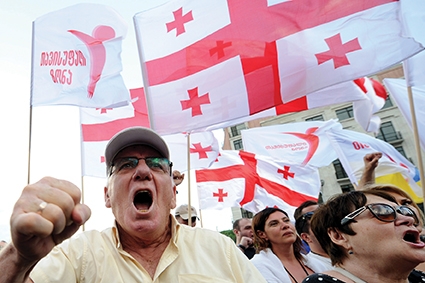Nothing Wrong with Georgia’s Russian Policy
Op-Ed
Looking at Russia-Georgia relations over the past 25 years, we usually tend to overemphasize mistakes made by various Georgian governments, or solely stress how geopolitically active Moscow has been in the South Caucasus. However, if we look closer at the dynamics of the bilateral relations, one might find a strong consistency on a par with Georgian leaders.
From Zviad Gamsakhurdia, first President of Georgia, to the current PM, Georgia’s foreign policy was pro-Western. Indeed, Gamsakhurdia and later on Mikheil Saakashvili were at times radically anti-Russian, while current leaders are modest; but this does not change the overall picture of Georgia being persistently pro-western.
Surely, one of the options could have been to give up on its EU/NATO membership stance and embrace a pro-Russian position under Russian guarantees that Abkhazia and South Ossetia (Samachablo) would rejoin Tbilisi. But in geopolitics, this thinking does not always work, as Georgia’s geographic position allows Tbilisi be more active as a regional transit hub, and not be oriented towards one country (hypothetically Russia). However, this also does not preclude Georgia and Russia from talking to each other and fostering economic relations. The non-existence of diplomatic relations as well as deep troubles around Abkhazia and South Ossetia would, in the grand scheme of things, not stop Tbilisi from creating closer economic contacts with Russian businesses. It is a fact that Russia is Georgia’s neighbor, and it would be impossible not to talk to Moscow on a permanent basis. To that end, the current Georgian leadership is doing so rather cleverly.
Indeed, Russia is still economically vital for Georgia. Consider the following statistics: Russia is the largest source of remittances for Georgia. $45m (USD), or 32.5% of total remittances, was transferred to Georgia from Russia in December of last year. Moreover, trade routes (with Tbilisi control) through Abkhazia and South Ossetia are currently in-progress.
At the same time, we should also be aware of what the geopolitical imperatives which drive Russia’s foreign policy in the South Caucasus are. We deal here not necessarily with the anti-Georgian government of Vladimir Putin, but rather a well-thought out strategy on the Russian part as to how to effectively project its military power into the region, by limiting the barrier capacity of the Caucasus Mountains.
This would also mean that in the event of a regime change in Moscow, it is very unlikely that there would be a change in Russian foreign policy towards the South Caucasus. It is in Russia’s vital interests to keep Georgia at least unstable. On the opposite side, the loss of Georgia to the West would mean a rapid decrease of Russian power, with much wider ramifications for the entire former Soviet space. “Russia-free” Georgia is a nightmare for Moscow, as the Kremlin would then be less able to pressure Azerbaijan on export routes. Moreover, the Caspian energy corridor would again see its relevance and Central Asian gas could reach Europe.
Overall, it could be argued that Georgia is pursuing a clever strategy of positioning itself not as an anti-Russian state, but at the same time also not abandoning its pro-western course. The ideal scenario for Tbilisi would be when all the neighboring countries have a stake in the security of Georgia. In addition, large players, such as China with its Belt and Road Initiative, the EU, the US and others would also be involved in the economics of the country. This might create a certain balance in the region.
On a local basis, though, to be competitive in the issue of the reclaiming of Abkhazia and South Ossetia, Tbilisi should lay out a clear strategy for the country’s internal development: strong economy and education. Whatever geopolitical scenarios are played out in the future, one would still have to persuade many in the breakaway territories to embrace Tbilisi. And to do this, beyond the fortunate exterior situation in the region, the situation needs to be appealing.
Emil Avdaliani












